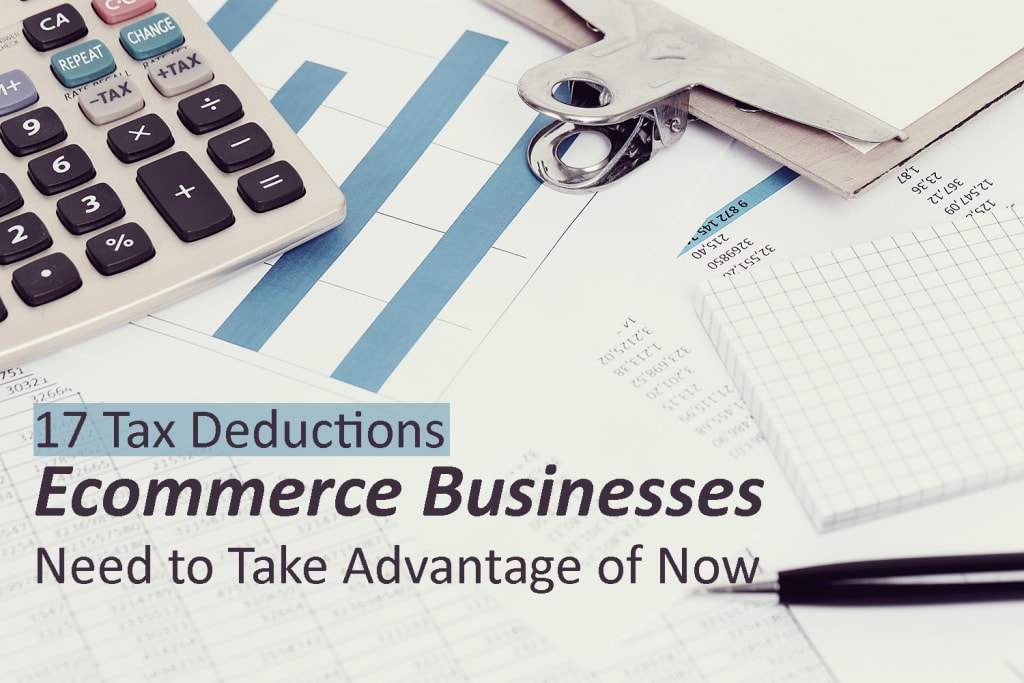17 Tax Deductions Ecommerce Businesses Need to Take Advantage of Now
A Planned Financial Strategy to Reduce the Taxes on your Income.

Launching an online store is easier than you initially thought. But there’s always a catch. The more profits you earn, the higher the income tax will be. The high amount of taxes hurt the most right? You do not want to jinx your successful eCommerce business by delaying tax filings but being an eCommerce entrepreneur you can learn to take advantage of the eCommerce tax deductions too.
Paying off huge bills and other online business expenses can be as spooky as Friday the 13th, but guys relax! There are ways you need to discover the tax season to be less scary and a lot less painful when you claim the tax deductions.
To help you learn, we have compiled a list of eCommerce tax deductions that any eCommerce entrepreneur can use to their own advantage.
Before you can jump down discovering what online business expenses you can later claim as tax deductions, be sure to have the receipts and tax records for them.
Take a Look at the most Charming List you need in your Cart!
Running an online store is super cheap and yet can lead to higher online business expenses. You need to identify which of the online business expenses are ordinary (most common expenses like paying utility bills) and necessary (helpful expenses like investing in bookkeeping services).
So let us embark you with the knowledge that while your business grows you can write off the following deductions.
- Shipping
- Workspace
- Banking and insurance
- Professional services
- Workers
- Marketing
- Website fees
- Education
- Travel
We have further elaborated the terms for an easier understanding.
Shipping
A regular business with an online website needs to take care of the delivery. Unless you are a drop shipping store, you do not need to worry about the postage, shipping meter subscriptions, delivery charges, etc. all of that is deductible!
1. Packaging
The best part about the shipping is the packaging. The online business expense that occurred for e-commerce packaging is deductible on your tax return. Items like envelopes, paper, boxes, packaging material, tape, and printer ink, etc. are common examples.
Workspace
2. Home office
Chances are, your online store is home-based. If so, you are eligible for the eCommerce tax deduction.
The deduction size will matter on how much of your home portion is dedicated as the home office. There are some possible considerations like;
- The home office is used only for business activities. You specifically spend time and use the dedicated workspace as your work desk.
- The home office must be the principal base of your eCommerce store. You will need t to prove it with a work calendar, or a printed schedule, etc.
- The time spent in the home office must be related to your online business, not the domestic chores.
Since the home office is a dedicated place, it should be the sole place of your business interest. There are two options for home office deduction;
- Simplified Method - $5 is deducted per square foot of the home occupied as a home office.
- Regular Method - it is unsurprisingly the easier one. Just calculate the home’s square footage percentage dedicated as home office space. Apply the percentage for your home expenses like rent or mortgage interest, electricity, etc.
You can choose any of the methods best suited for your eCommerce business.
3. Coworking Space
If you have rented a coworking space, contributing towards the cost of utilities and office supplies - then you have the chance for an eCommerce tax deduction too. But first, you need to consult with a CPA.
4. Repairs and Renovations
An online business expense is a real thing when the home office is in need of repair or maintenance. Needing to fix a broken window, or replace the desk is a business expense on your tax return.
So whatever repair is required for home office maintenance is classified for the tax deduction. Also, discuss this in detail with your CPA.
Banking and Insurance
5. Business Interest
Using a business credit means you can take a small business loan but you still need to pay interest for the financial year. That interest is also tax-deductible. Similar is the case with the bank fees for maintaining your bank checking account.
6. Business Insurance
Whether you are operating as an S-Corporation, an LLC, or as self-employed, business insurance in all cases is deductible.
Some of the most common business insurance you can benefit from includes;
- Commercial property insurance
- Data breach insurance
- Professional liability insurance
- Worker’s compensation insurance etc.
If you hold a member of any of the above-mentioned insurance policies, you can expect to write off the premiums.
7. Health Insurance
Even as self-employed you qualify for the health insurance premium deduction. According to the Small Business Jobs Act, it creates a new deduction. You can deduct 100% of health insurance for the following individuals
- Yourself
- Spouse
- Dependents
- Children under age 27
Claim for health insurance deduction for any of them.
Professional Services
8. Accounting and Bookkeeping Services
Did you know a tax consultant’s advice about business expenses can be deducted as well?
The professional service deduction is a real thing even for the eCommerce business. The expense that happens on hiring a range of professional services like bookkeepers, CPAs, accountants, etc, and the fees incurred are an eCommerce tax deduction.
9. Legal Fees
When you hire an attorney to prepare contracts, file trademarks, or negotiate leases, etc. their fees can also be written off as the tax deduction. Even if they perform some other legal services for your business, the fees incurred will also qualify as a tax deduction.
Workers
10. Independent Contractors
Also known as freelancers, the services provided to your business for a specific project by independent contractors are also tax-deductible. For instance, if you hire a bookkeeper for a short span of time or a writer for a blog. The cost of their services qualifies for your eCommerce tax deduction.
As an employer, you need to give Form 1099 to the independent workers for tax purposes.
11. Employees
No, your independent contractors are not your employees - hence the reason for labeling them as “contractors or freelancers”.
Employees work with you long-term in-house and can enjoy the benefits, compensation, insurance, etc like;
- Employee pay
- Vacations leaves
- Sick leaves
- Life insurance
- Free meals etc.
Sole proprietors and LLCs need to mention these online business expenses in Schedule C. partnerships and multi-member LLCs can use it in Form 1065 under the Deductions section. corporations can use Form 1120 or Form 1120-S for S Corps.
Marketing
12. Advertising
Your eCommerce business needs some serious online advertising too. To help grow your business (with fewer taxes) you need to advertise on the right channels. Instagram and Facebook are the top choices for digital platforms.
Whatever online business expense is spent on marketing is worth the tax deduction too. You will be hiring a designer, copywriter, or any marketing professional to create ads for you, which is a business expense.
13. Marketing Tools
Using an email tool like AdEspresso for your Facebook campaigns will count as an ordinary and necessary expense but for marketing purposes. Whatever cost of subscription you paid for the paid tool is qualified for a tax deduction.
For the paid marketing tools, you buy any one of the available pricing plans, so the particular amount can be deducted.
Website Fees
14. Domain Hosting
Running an eCommerce store means you need to get hold of a domain. The taxes for domain and web hosting are also deductible.
Any image or design purchased for the business purpose or an upgrade in the website theme is tax-deductible too.
15. Website Services
With an online store comes a bunch of other services that help you engage with potential customers. For instance publishing a newsletter is favorable for any online business. The email tool you decide for sending emails to your subscribers, the tool used to schedule social media posts, etc falls under the category of website services.
These services are tax-deductible.
Education
16. Courses
If you have undergone any course to upgrade your skill that is relevant to your business, the cost can be deducted.
The courses, if paid, are qualified for deduction. For instance, you get a certification for a Certified eCommerce Consultant, which will cost you and so is deductible.
Travel
17. Flights or Vehicle Expense
An eCommerce entrepreneur has to move around a lot. The mileage expense that occurs due to traveling around for packages and any business-related operations can be deducted as well.
A vehicle used for business purposes is a direct expense. But if you use the same vehicle for personal and business use, calculate the percentage cost of operations eligible for business. For instance, you can opt to choose for a standard mileage rate deduction or pay the entire cost over the year.
It’s easy to get tempted to be creative with a tax deduction, instead, you must follow a planned financial strategy to reduce the taxes on your income. The world of business is not black and white, there are lots of loopholes and pits that can draw unnecessary attention even for an online store, so it's best to always talk to a professional when its about tax deductions.
About the Creator
Vasiliki Greece
Remote Business Consultant, Creative Content Writer, Blogger, Vlogger, Traveler, and Philanthropist.






Comments
There are no comments for this story
Be the first to respond and start the conversation.